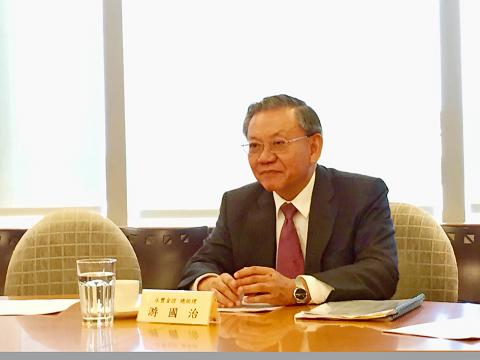SinoPac Financial Holdings Co (永豐金控) yesterday confirmed the resignation of a number of top executives announced late on Wednesday following repeated run-ins with regulators due to the firm’s shortcomings in governing the activities of its subsidiaries.
On July 1, Yu Kuo-chih (游國治) would be relieved of his posts at the company, which are president and chief financial officer of SinoPac Financial, and chairman of Bank SinoPac (永豐銀行), SinoPac Financial said in a statement.
Tsai Chien-chih (蔡建志), chairman and president of SinoPac Securities (Asia) Ltd (永豐金證券亞洲), a Hong Kong-based brokerage subsidiary, and Chuang Yao (莊耀), president of SinoPac Leasing Co (永豐金租賃), would also be leaving their posts, the company said.

Photo: Wang Meng-lun, Taipei Times
The company’s leasing and banking unit had violated regulations by extending questionable loans to companies whose proprietors are related to SinoPac Financial’s founding family, surnamed Ho (何), and its Hong Kong-based brokerage had racked up infractions by processing purchases of in Tatung Co (大同) shares on behalf of Chinese investors amid an ongoing proxy fight at the home appliances brand.
The Hong Kong-based brokerage and its clients had also incurred considerable losses after a precipitous plunge in China Huishan Dairy Holding Co (中國輝山乳業) shares, with Hong Kong regulators later suspending trading in the stock.
The Financial Supervisory Commission, which last month slapped SinoPac Financial with a NT$100 million (US$3.32 million) fine for the infractions, yesterday commended the leadership change at the company, and said that it would continue to monitor its efforts to improve corporate governance.
However, the commission said it cannot penalize the Hong Kong-based brokerage for facilitating stock purchases by Chinese investors due to limitations set by the Act Governing Relations Between the People of the Taiwan Area and the Mainland Area (臺灣地區與大陸地區人民關係條例).
Regarding China Huishan Dairy, the commission said that the brokerage did not break rules set by Hong Kong financial regulators.
Meanwhile, New Power Party Executive Chairman Huang Kuo-chang (黃國昌) yesterday said he was not satisfied with the resignations as SinoPac Financial chairman Ho Shou-chuan (何壽川), who he said was the main culprit for the infractions, remained unscathed.
SinoPac Financial has also canceled an investors’ conference scheduled for next week.
The company has outlined plans to reduce the number of positions that an executive can occupy, and improve internal controls against risks and conflicts of interests in dealings with interested parties.

DAREDEVIL: Honnold said it had always been a dream of his to climb Taipei 101, while a Netflix producer said the skyscraper was ‘a real icon of this country’ US climber Alex Honnold yesterday took on Taiwan’s tallest building, becoming the first person to scale Taipei 101 without a rope, harness or safety net. Hundreds of spectators gathered at the base of the 101-story skyscraper to watch Honnold, 40, embark on his daredevil feat, which was also broadcast live on Netflix. Dressed in a red T-shirt and yellow custom-made climbing shoes, Honnold swiftly moved up the southeast face of the glass and steel building. At one point, he stepped onto a platform midway up to wave down at fans and onlookers who were taking photos. People watching from inside

A Vietnamese migrant worker yesterday won NT$12 million (US$379,627) on a Lunar New Year scratch card in Kaohsiung as part of Taiwan Lottery Co’s (台灣彩券) “NT$12 Million Grand Fortune” (1200萬大吉利) game. The man was the first top-prize winner of the new game launched on Jan. 6 to mark the Lunar New Year. Three Vietnamese migrant workers visited a Taiwan Lottery shop on Xinyue Street in Kaohsiung’s Gangshan District (崗山), a store representative said. The player bought multiple tickets and, after winning nothing, held the final lottery ticket in one hand and rubbed the store’s statue of the Maitreya Buddha’s belly with the other,

‘NATO-PLUS’: ‘Our strategic partners in the Indo-Pacific are facing increasing aggression by the Chinese Communist Party,’ US Representative Rob Wittman said The US House of Representatives on Monday released its version of the Consolidated Appropriations Act, which includes US$1.15 billion to support security cooperation with Taiwan. The omnibus act, covering US$1.2 trillion of spending, allocates US$1 billion for the Taiwan Security Cooperation Initiative, as well as US$150 million for the replacement of defense articles and reimbursement of defense services provided to Taiwan. The fund allocations were based on the US National Defense Authorization Act for fiscal 2026 that was passed by the US Congress last month and authorized up to US$1 billion to the US Defense Security Cooperation Agency in support of the

HIGH-TECH DEAL: Chipmakers that expand in the US would be able to import up to 2.5 times their new capacity with no extra tariffs during an approved construction period Taiwan aims to build a “democratic” high-tech supply chain with the US and form a strategic artificial intelligence (AI) partnership under the new tariffs deal it sealed with Washington last week, Taipei’s top negotiator in the talks said yesterday. US President Donald Trump has pushed Taiwan, a major producer of semiconductors which runs a large trade surplus with the US, to invest more in the US, specifically in chips that power AI. Under the terms of the long-negotiated deal, chipmakers such as Taiwan Semiconductor Manufacturing Co (TSMC, 台積電) that expand US production would incur a lower tariff on semiconductors or related manufacturing